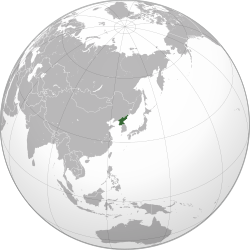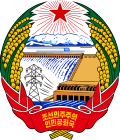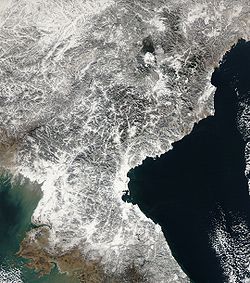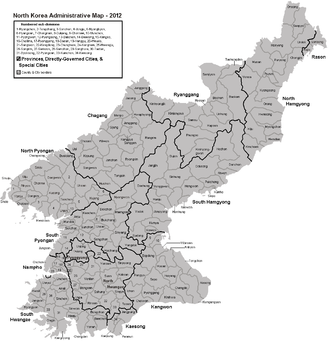

The following outline is provided as an overview of and topical guide to North Korea:
Contents
- General reference
- Geography of North Korea
- Environment of North Korea
- Regions of North Korea
- Demography of North Korea
- Government and politics of North Korea
- Branches of the government of North Korea
- Foreign relations of North Korea
- Law and order in North Korea
- Military of North Korea
- Local government in North Korea
- History of North Korea
- History of North Korea, by period
- History of Korea, by region
- History of Korea, by subject
- Culture of North Korea
- Art in North Korea
- People of North Korea
- Sports in North Korea
- Economy and infrastructure of North Korea
- Communications in North Korea
- Transport in North Korea
- Education in North Korea
- Health in North Korea
- Bibliographies
- See also
- References
- External links
North Korea is a sovereign country located on the northern half of the Korean Peninsula in East Asia. [1] To the south, separated by the Korean Demilitarized Zone, lies South Korea, with which it formed one nation until division following World War II. At its northern Amnok River border are China and, separated by the Tumen River in the extreme north-east, Russia. The capital of North Korea is the city of Pyongyang.
North Korea is widely considered to be a Stalinist dictatorship. [2] [3] [4] [5] [6] [7] The country's government styles itself as following the Juche ideology of self-reliance, developed by Kim Il Sung, the country's former leader. The current supreme leader is General Secretary Kim Jong Un, the first leader Kim Il Sung's grandson and son of deceased leader Kim Jong Il. Relations are strongest with other officially socialist states: Cuba, Vietnam, Laos, and China, as well as with Russia, Cambodia, and Myanmar. Following a major famine in the early 1990s, due partly to the collapse of the Soviet Union (previously a major economic partner), leader Kim Jong Il instigated the "Military-First" policy in 1995, increasing economic concentration and support for the military.
North Korea's culture is officially promoted and heavily controlled by the government. The Arirang Festivals or "Mass Games" are government-organized events glorifying the regime, involving over 100,000 performers.





